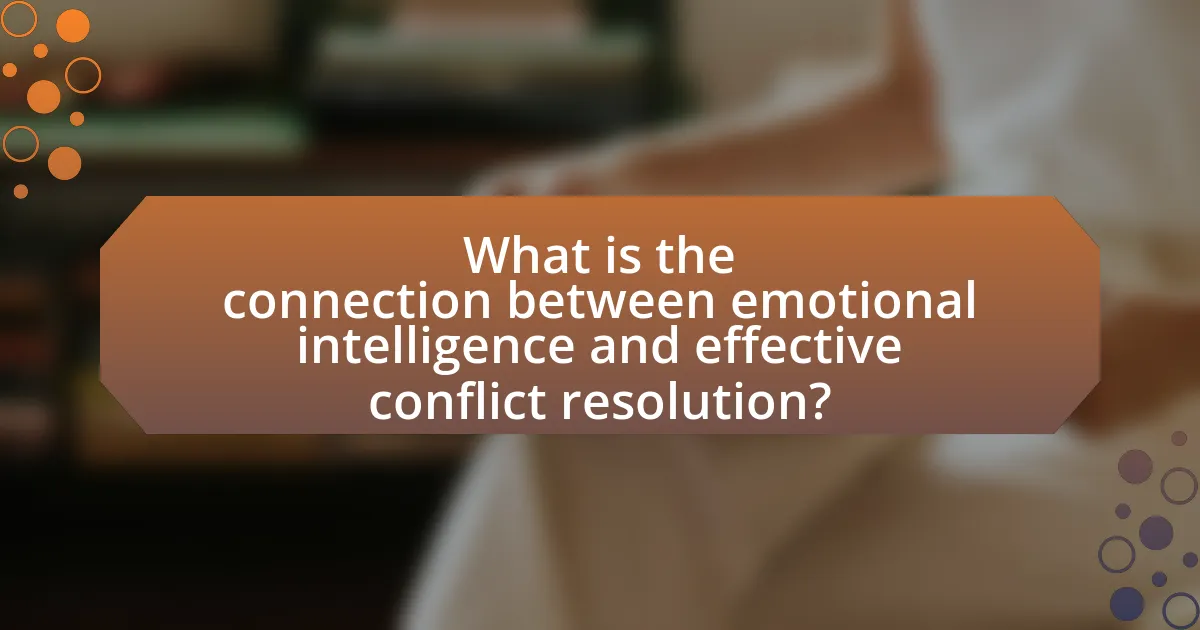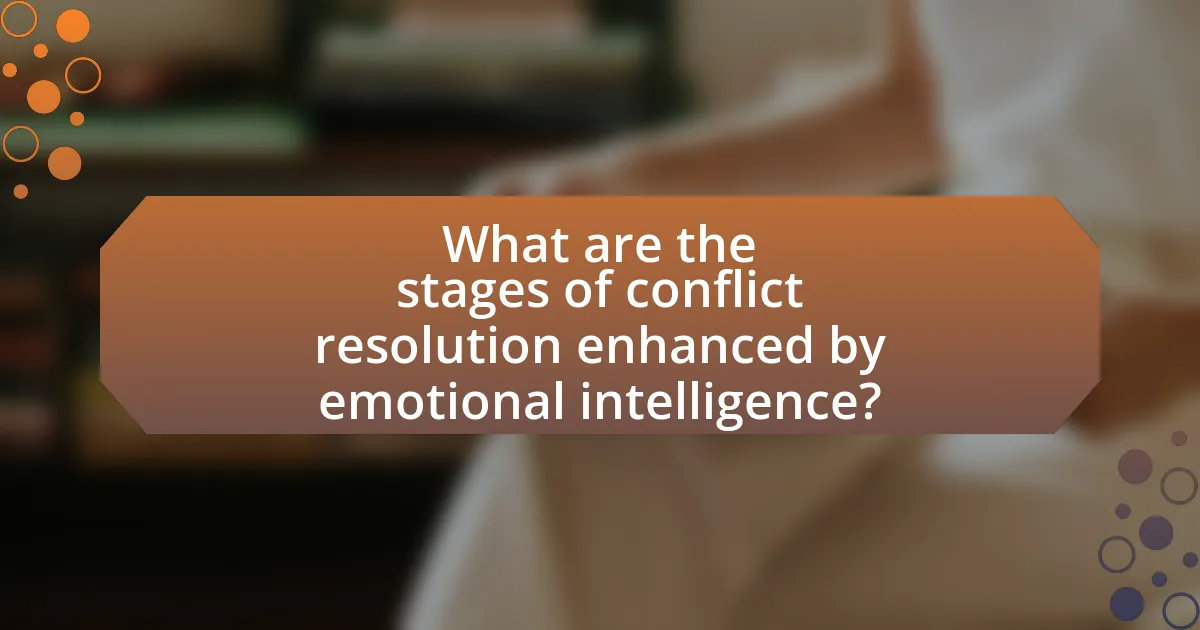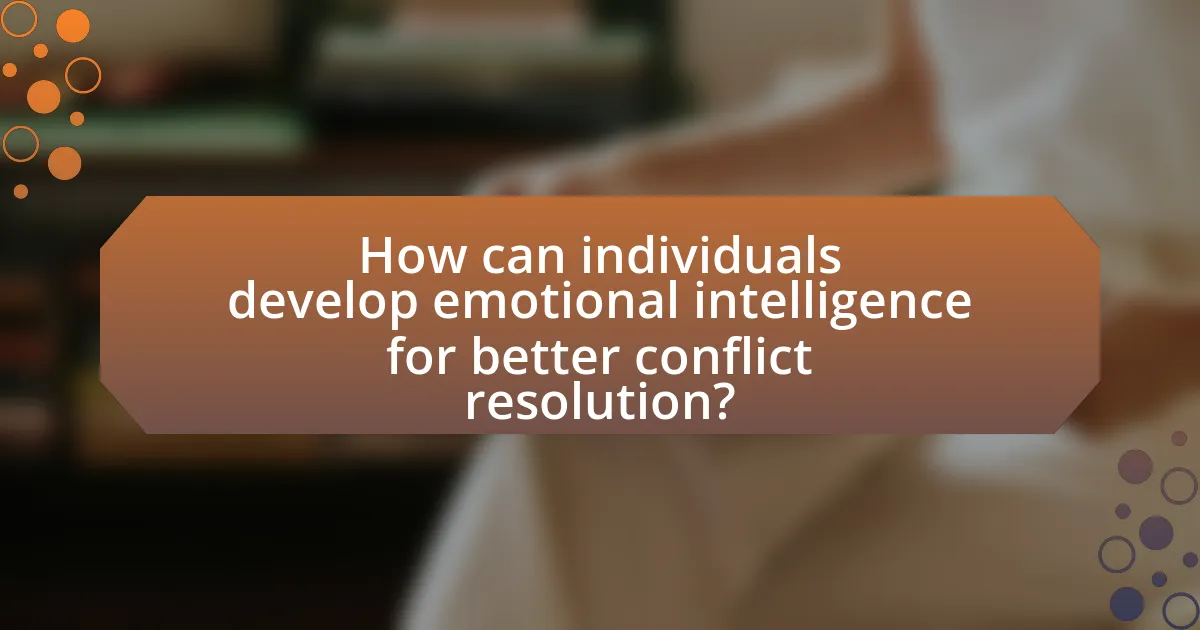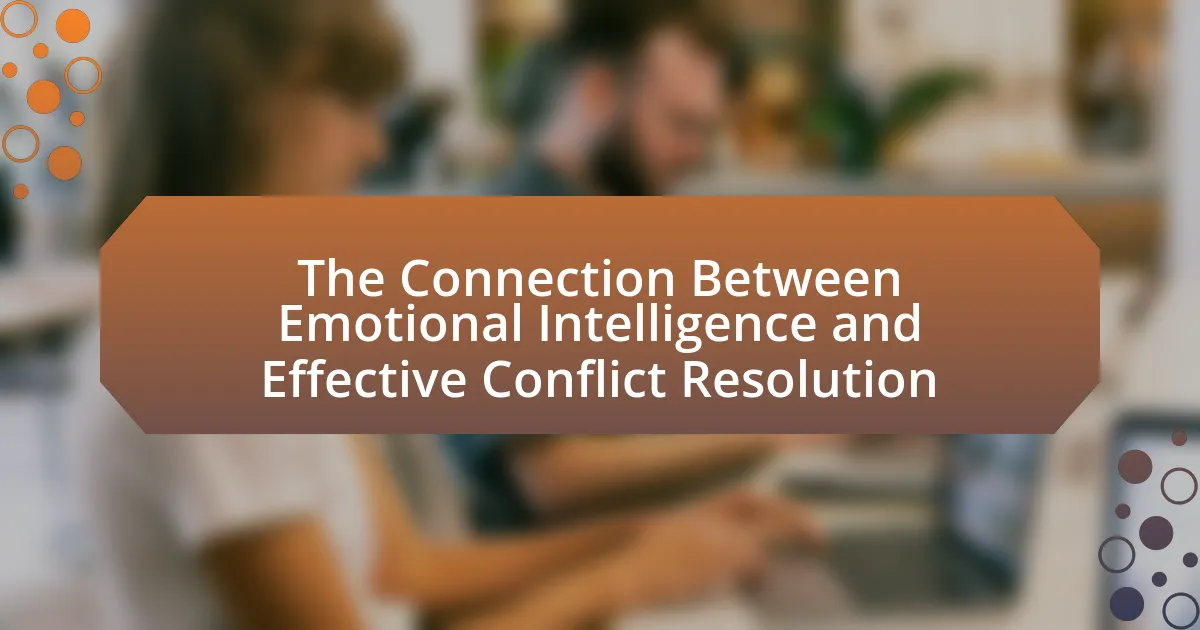The article explores the connection between emotional intelligence and effective conflict resolution, highlighting how emotional intelligence enhances individuals’ ability to understand and manage their own emotions and those of others. Key components such as self-awareness, self-regulation, empathy, and social skills are examined for their roles in facilitating constructive dialogue and collaboration during conflicts. The article also discusses strategies for developing emotional intelligence, the importance of active listening, and the impact of emotional awareness on conflict dynamics. Research findings underscore the significance of emotional intelligence in achieving positive conflict resolution outcomes and fostering stronger interpersonal relationships.

What is the connection between emotional intelligence and effective conflict resolution?
Emotional intelligence significantly enhances effective conflict resolution by enabling individuals to understand and manage their own emotions and those of others. This understanding fosters empathy, which is crucial in recognizing differing perspectives during conflicts. Research indicates that individuals with high emotional intelligence are better equipped to navigate disagreements, as they can remain calm, communicate clearly, and find mutually beneficial solutions. For instance, a study published in the Journal of Organizational Behavior found that teams with higher emotional intelligence demonstrated improved conflict management skills, leading to more constructive outcomes.
How does emotional intelligence influence conflict resolution skills?
Emotional intelligence significantly enhances conflict resolution skills by enabling individuals to recognize, understand, and manage their own emotions and the emotions of others. This heightened awareness facilitates better communication, allowing for more empathetic interactions during conflicts. Research indicates that individuals with high emotional intelligence are more adept at de-escalating tensions and finding mutually beneficial solutions, as they can navigate emotional dynamics effectively. For instance, a study published in the “Journal of Organizational Behavior” by Côté and Miners (2006) found that emotional intelligence positively correlates with conflict management styles, leading to more constructive outcomes in workplace disputes.
What are the key components of emotional intelligence relevant to conflict resolution?
The key components of emotional intelligence relevant to conflict resolution are self-awareness, self-regulation, empathy, and social skills. Self-awareness allows individuals to recognize their own emotions and triggers, which is crucial in managing responses during conflicts. Self-regulation helps in controlling impulsive reactions and maintaining composure, facilitating more constructive dialogue. Empathy enables individuals to understand and consider the emotions and perspectives of others, fostering a collaborative environment. Lastly, strong social skills aid in effective communication and relationship management, essential for resolving disputes amicably. Research by Goleman (1995) emphasizes that these components significantly enhance interpersonal interactions and conflict resolution outcomes.
How do these components interact during a conflict situation?
Emotional intelligence components, such as self-awareness, self-regulation, empathy, and social skills, interact during a conflict situation by influencing how individuals perceive and respond to the conflict. For instance, self-awareness allows individuals to recognize their own emotions and triggers, which can prevent escalation. Self-regulation helps in managing emotional responses, enabling a calmer approach to conflict resolution. Empathy facilitates understanding the perspectives of others, fostering collaboration rather than confrontation. Social skills enable effective communication, which is crucial for negotiating solutions. Research indicates that higher emotional intelligence correlates with better conflict resolution outcomes, as individuals with these skills are more adept at navigating interpersonal dynamics and finding mutually beneficial solutions.
Why is emotional intelligence important in resolving conflicts?
Emotional intelligence is important in resolving conflicts because it enables individuals to understand and manage their own emotions while also empathizing with others. This understanding fosters effective communication, allowing parties to express their feelings and perspectives without escalating tensions. Research indicates that high emotional intelligence correlates with better conflict resolution outcomes, as individuals with this skill set can navigate disagreements more constructively. For instance, a study published in the Journal of Organizational Behavior found that teams with higher emotional intelligence demonstrated improved collaboration and reduced conflict, highlighting the critical role emotional awareness plays in achieving resolution.
What role does empathy play in conflict resolution?
Empathy plays a crucial role in conflict resolution by enabling individuals to understand and share the feelings of others, which fosters effective communication and collaboration. When parties involved in a conflict demonstrate empathy, they are more likely to acknowledge each other’s perspectives, leading to a reduction in hostility and an increase in mutual respect. Research indicates that empathetic engagement can significantly lower the likelihood of escalation in conflicts, as it encourages problem-solving rather than adversarial approaches. For instance, a study published in the Journal of Conflict Resolution found that empathy can enhance negotiation outcomes by promoting cooperative behavior among conflicting parties.
How does self-regulation contribute to effective conflict management?
Self-regulation significantly contributes to effective conflict management by enabling individuals to control their emotions and reactions during disputes. This control allows for a more rational approach to conflict resolution, reducing the likelihood of escalation and promoting constructive dialogue. Research indicates that individuals with high self-regulation skills can better manage stress and maintain focus on problem-solving rather than personal grievances, which is crucial in conflict situations. For instance, a study published in the Journal of Applied Psychology found that self-regulation is linked to improved negotiation outcomes, as individuals who can manage their emotions are more likely to reach mutually beneficial agreements.

What are the stages of conflict resolution enhanced by emotional intelligence?
The stages of conflict resolution enhanced by emotional intelligence include awareness, understanding, communication, negotiation, and resolution. Emotional intelligence facilitates awareness by enabling individuals to recognize their own emotions and those of others, which is crucial in identifying the root causes of conflict. Understanding follows, where empathy plays a key role in grasping different perspectives, fostering a collaborative environment. Effective communication is essential in this stage, as emotionally intelligent individuals can express their thoughts and feelings clearly while also being receptive to others. Negotiation involves finding common ground and solutions that satisfy all parties, supported by emotional regulation to manage stress and maintain a constructive dialogue. Finally, resolution is achieved when a mutually acceptable agreement is reached, often leading to stronger relationships and improved trust among the parties involved. Research indicates that individuals with high emotional intelligence are more adept at navigating these stages, resulting in more effective conflict resolution outcomes.
How can emotional intelligence be applied at each stage of conflict resolution?
Emotional intelligence can be applied at each stage of conflict resolution by enhancing understanding, communication, and empathy among the parties involved. In the initial stage of conflict identification, individuals can utilize emotional intelligence to recognize their own emotions and those of others, facilitating a clearer understanding of the underlying issues. During the discussion phase, emotional intelligence aids in active listening and expressing feelings constructively, which promotes open dialogue and reduces defensiveness. In the negotiation stage, individuals can leverage emotional intelligence to manage stress and maintain a calm demeanor, allowing for more effective problem-solving and compromise. Finally, in the resolution phase, emotional intelligence fosters empathy and encourages collaboration, ensuring that all parties feel heard and valued, which is crucial for sustainable conflict resolution. Research indicates that high emotional intelligence correlates with better conflict management outcomes, as individuals with these skills are more adept at navigating interpersonal dynamics and fostering positive relationships.
What strategies can be employed to manage emotions during conflicts?
To manage emotions during conflicts, individuals can employ strategies such as active listening, emotional regulation, and perspective-taking. Active listening involves fully concentrating on the speaker, which helps to validate their feelings and reduce tension. Emotional regulation techniques, such as deep breathing or mindfulness, allow individuals to maintain composure and respond thoughtfully rather than react impulsively. Perspective-taking encourages individuals to consider the other person’s viewpoint, fostering empathy and reducing hostility. Research indicates that these strategies enhance emotional intelligence, which is crucial for effective conflict resolution, as higher emotional intelligence correlates with better management of interpersonal disputes.
How can active listening improve conflict resolution outcomes?
Active listening significantly improves conflict resolution outcomes by fostering understanding and empathy between conflicting parties. When individuals engage in active listening, they demonstrate genuine interest in the perspectives and emotions of others, which can de-escalate tensions and promote a collaborative atmosphere. Research indicates that effective communication, including active listening, can lead to more satisfactory resolutions, as it allows parties to clarify misunderstandings and express their needs more clearly. For instance, a study published in the Journal of Conflict Resolution found that active listening techniques, such as paraphrasing and summarizing, enhance mutual respect and trust, which are crucial for resolving disputes effectively.
What are common challenges faced in conflict resolution without emotional intelligence?
Common challenges faced in conflict resolution without emotional intelligence include poor communication, inability to empathize, and heightened emotional responses. Poor communication arises because individuals may struggle to articulate their feelings or understand others’ perspectives, leading to misunderstandings. The inability to empathize prevents individuals from recognizing the emotional states of others, which can exacerbate tensions and hinder collaborative problem-solving. Heightened emotional responses, such as anger or frustration, can cloud judgment and escalate conflicts rather than resolve them, making it difficult to reach a constructive outcome. These challenges highlight the critical role emotional intelligence plays in facilitating effective conflict resolution.
How does a lack of emotional awareness affect conflict dynamics?
A lack of emotional awareness significantly disrupts conflict dynamics by preventing individuals from recognizing and understanding their own emotions and those of others. This deficiency leads to miscommunication, as parties may misinterpret intentions or feelings, escalating tensions rather than resolving them. Research indicates that emotional awareness is crucial for effective conflict resolution; for instance, a study published in the Journal of Conflict Resolution found that individuals with higher emotional intelligence are better at navigating disputes, as they can empathize and respond appropriately to emotional cues. Consequently, without emotional awareness, conflicts are more likely to become entrenched, resulting in prolonged disputes and ineffective resolutions.
What are the consequences of poor emotional regulation in conflicts?
Poor emotional regulation in conflicts leads to escalated tensions and unresolved issues. When individuals cannot manage their emotions, they may react impulsively, resulting in aggressive or defensive behaviors that hinder constructive dialogue. Research indicates that poor emotional regulation can lead to increased stress and anxiety, which further complicates conflict resolution efforts. For instance, a study published in the Journal of Personality and Social Psychology found that individuals with low emotional regulation skills are more likely to engage in destructive conflict behaviors, such as yelling or stonewalling, which ultimately prolongs disputes and damages relationships.

How can individuals develop emotional intelligence for better conflict resolution?
Individuals can develop emotional intelligence for better conflict resolution by practicing self-awareness, empathy, and effective communication. Self-awareness involves recognizing one’s own emotions and understanding how they influence behavior, which can help individuals manage their reactions during conflicts. Empathy allows individuals to understand and appreciate the emotions of others, fostering a collaborative environment. Effective communication skills, including active listening and expressing thoughts clearly, facilitate constructive dialogue and reduce misunderstandings. Research indicates that individuals with higher emotional intelligence are more adept at resolving conflicts, as they can navigate emotional dynamics and maintain positive relationships.
What practical steps can be taken to enhance emotional intelligence?
To enhance emotional intelligence, individuals can practice self-awareness, improve empathy, and develop emotional regulation skills. Self-awareness involves recognizing one’s own emotions and understanding their impact on thoughts and behaviors, which can be cultivated through mindfulness practices and reflective journaling. Improving empathy requires actively listening to others and trying to understand their perspectives, which can be achieved by engaging in open conversations and asking clarifying questions. Developing emotional regulation skills entails learning to manage and respond to emotions appropriately, which can be practiced through techniques such as deep breathing, cognitive reframing, and seeking feedback from trusted peers. These steps are supported by research indicating that emotional intelligence can be developed through targeted training and practice, leading to better interpersonal relationships and conflict resolution outcomes.
How can mindfulness practices improve emotional awareness?
Mindfulness practices enhance emotional awareness by promoting present-moment attention and non-judgmental observation of thoughts and feelings. This heightened awareness allows individuals to recognize and understand their emotional responses more clearly, leading to better emotional regulation. Research by Keng, Smoski, and Robins (2011) in “Effects of mindfulness on psychological health: A review of empirical studies” indicates that mindfulness training significantly improves emotional awareness and reduces emotional reactivity. By cultivating a mindful approach, individuals can identify their emotions as they arise, facilitating more effective conflict resolution and interpersonal communication.
What role does feedback play in developing emotional intelligence?
Feedback is crucial in developing emotional intelligence as it provides individuals with insights into their emotional responses and behaviors. By receiving feedback from others, individuals can identify areas for improvement in their emotional awareness, regulation, and interpersonal skills. Research indicates that feedback enhances self-reflection, which is a key component of emotional intelligence, allowing individuals to better understand their emotions and the emotions of others. For instance, a study published in the Journal of Applied Psychology by London and Smither (2002) found that feedback significantly improves self-awareness, a core element of emotional intelligence, leading to better conflict resolution skills.
What are the best practices for applying emotional intelligence in conflict resolution?
The best practices for applying emotional intelligence in conflict resolution include active listening, empathy, self-regulation, and effective communication. Active listening involves fully concentrating on the speaker, which fosters understanding and reduces misunderstandings. Empathy allows individuals to recognize and validate the emotions of others, creating a supportive environment for dialogue. Self-regulation helps individuals manage their emotions, preventing escalation during conflicts. Effective communication ensures that messages are conveyed clearly and respectfully, facilitating resolution. Research by Goleman (1995) in “Emotional Intelligence” highlights that these practices enhance interpersonal relationships and lead to more constructive outcomes in conflict situations.
How can one create a safe environment for open dialogue during conflicts?
To create a safe environment for open dialogue during conflicts, one must establish clear communication guidelines that promote respect and active listening. This involves setting ground rules that encourage participants to express their thoughts without interruption and to focus on understanding rather than responding defensively. Research indicates that environments fostering emotional intelligence, such as those where empathy and self-regulation are prioritized, significantly enhance conflict resolution outcomes. For instance, a study published in the Journal of Conflict Resolution found that teams with high emotional intelligence demonstrated improved collaboration and reduced misunderstandings during conflicts, highlighting the importance of emotional awareness in facilitating open dialogue.
What techniques can be used to foster collaboration and understanding?
Techniques to foster collaboration and understanding include active listening, empathy, and open communication. Active listening involves fully concentrating on the speaker, which enhances mutual respect and reduces misunderstandings. Empathy allows individuals to recognize and validate each other’s feelings, creating a supportive environment conducive to collaboration. Open communication encourages transparency and honesty, facilitating the sharing of ideas and concerns. Research indicates that teams employing these techniques experience improved conflict resolution and stronger interpersonal relationships, as evidenced by a study published in the Journal of Applied Psychology, which found that effective communication significantly correlates with team performance and cohesion.
